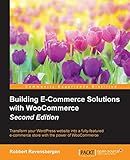Best WooCommerce Metadata Tools to Buy in October 2025

The Ultimate WordPress & WooCommerce Handbook: From Setup to Success in Online Selling



WordPress WooCommerce: Tienda online con WooCommerce (Spanish Edition)



Building E-Commerce Solutions with WooCommerce - Second Edition



WordPress WooCommerce: Webshop met WooCommerce (Dutch Edition)



Formation Woocommerce: Créer et exploiter une boutique en ligne (French Edition)



Setting Up and Running an Online Store


To get product specific meta data in WooCommerce, you can use the get_post_meta() function provided by WordPress. This function allows you to retrieve meta data associated with a specific product post.
To get the meta data for a specific product, you need to pass the product ID and the meta key you want to retrieve as parameters to the get_post_meta() function. You can then store the returned meta data in a variable for further use.
For example, if you want to get the price meta data for a product with ID 123, you can use the following code:
$price = get_post_meta(123, '_price', true);
This will retrieve the price meta data for the product with ID 123 and store it in the $price variable.
You can retrieve other product specific meta data in a similar manner by passing the appropriate product ID and meta key to the get_post_meta() function.
What is the importance of product meta data for SEO in Woocommerce?
Product meta data plays a crucial role in SEO for Woocommerce for several reasons:
- Improved search engine visibility: Meta data, including meta titles and descriptions, help search engines understand the content of your product pages. By optimizing meta data with relevant keywords, you can improve your chances of ranking higher in search engine results pages.
- Higher click-through rates: Well-written meta titles and descriptions can also entice users to click on your product pages by providing a clear and concise overview of the product. This can lead to higher click-through rates and ultimately more traffic to your site.
- Better user experience: Meta data helps users quickly identify if a product meets their needs, leading to a better overall user experience. This can result in higher conversion rates and ultimately more sales.
- Structured data integration: Woocommerce allows you to integrate structured data markup, such as schema.org, into your product pages. This helps search engines better understand the content of your products, which can lead to enhanced search results features like rich snippets.
Overall, optimizing product meta data in Woocommerce is essential for improving search engine visibility, attracting more organic traffic, and providing a better user experience for customers.
What is the impact of product meta data on product recommendations in Woocommerce?
Product meta data in Woocommerce can have a significant impact on product recommendations. By adding detailed and accurate meta data to products, such as product descriptions, tags, categories, and attributes, it allows the recommendation system to better understand and categorize products.
This, in turn, helps to improve the accuracy and relevance of the product recommendations being generated for customers. For example, if a customer is browsing a specific category of products, having detailed meta data associated with those products can help the recommendation system to suggest related or complementary products that the customer may also be interested in.
Additionally, product meta data can also impact the overall user experience on the website by making it easier for customers to find and discover products that align with their preferences and needs. Overall, having strong product meta data in Woocommerce can lead to more personalized and targeted product recommendations, which can ultimately result in increased sales and customer satisfaction.
How to get a list of all product meta data in Woocommerce?
To get a list of all product meta data in WooCommerce, you can use the following code snippet:
$get_products = new WP_Query( array('post_type' => 'product', 'posts_per_page' => -1) );
if($get_products->have_posts()) { while($get_products->have_posts()) { $get_products->the_post();
$product\_id = get\_the\_id();
$product\_meta = get\_post\_meta($product\_id);
echo "<h3>" . get\_the\_title() . "</h3>";
echo "<ul>";
foreach($product\_meta as $meta\_key => $meta\_value) {
echo "<li><strong>" . $meta\_key . ":</strong> " . implode(', ', $meta\_value) . "</li>";
}
echo "</ul>";
}
wp\_reset\_postdata();
}
This code snippet will query all products in WooCommerce, loop through each product and get its meta data using the get_post_meta() function. It will then display the product title and a list of all meta data associated with the product.
You can add this code to your theme's functions.php file or in a custom plugin to display a list of all product meta data in WooCommerce.
What is the role of product meta data in product sorting options in Woocommerce?
Product meta data in Woocommerce plays a crucial role in product sorting options. Meta data includes product attributes such as size, color, price, and other characteristics that help categorize and organize products on an e-commerce website.
When a customer visits a website, they may want to filter products based on specific criteria such as price range, size, or color. Product meta data allows for this sorting and filtering of products based on these attributes, making it easier for customers to find the products they are looking for.
In Woocommerce, product sorting options can be customized and configured based on the available meta data for each product. This can include sorting by price, popularity, or any other attribute that is associated with the product. By utilizing product meta data effectively, businesses can enhance the user experience on their website and help customers quickly find the products they want to purchase.
What is the best practice for managing product meta data in Woocommerce?
Managing product meta data in Woocommerce can be a crucial aspect of running a successful eCommerce store. Here are some best practices for managing product meta data in Woocommerce:
- Use relevant and descriptive meta data: Make sure to include relevant and descriptive meta data for each product, including titles, descriptions, keywords, and other attributes that will help customers find and understand your products.
- Optimize meta data for search engines: Use keywords and phrases that are relevant to your products in your meta data to improve search engine visibility and drive more organic traffic to your store.
- Organize meta data efficiently: Use categories and tags to organize your products and make it easier for customers to navigate and find what they are looking for.
- Regularly update and maintain meta data: Make sure to regularly review and update your product meta data to ensure accuracy and relevancy. This includes updating product descriptions, keywords, and other attributes as needed.
- Use plugins and tools to enhance meta data management: Consider using plugins and tools such as Yoast SEO or All in One SEO Pack to help optimize and manage your product meta data more effectively.
By following these best practices, you can ensure that your product meta data is well-managed and optimized to drive more traffic and sales to your online store.
